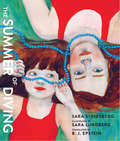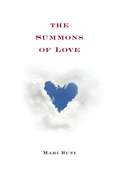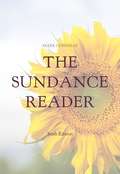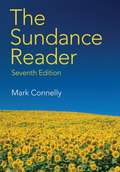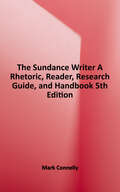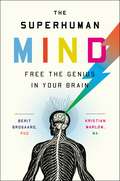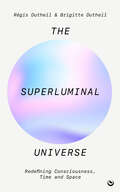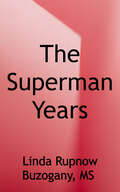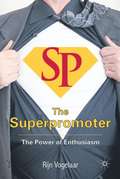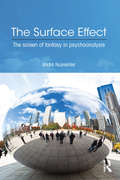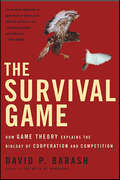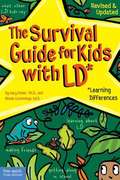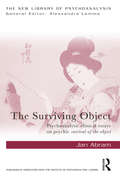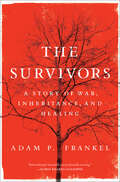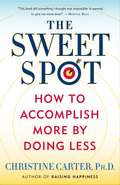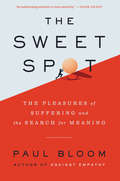- Table View
- List View
The Summer Visitors: A heart-warming story about love, second chances and moving on
by Fiona O'Brien'Grown up, intelligent fiction - she just gets better and better' Cathy Kelly'One of the smartest writers of popular fiction around' Irish IndependentWhen handsome American Daniel O'Connell arrives in Ballyanna to research an old cable station for a documentary he is making, he's hoping that a stay in a sleepy Irish seaside town will help him and his traumatised son move on from a terrible accident. But Daniel soon finds that summer in Ballyanna is anything but quiet ...Meanwhile Annie Sullivan, daughter of the local hotel owner, has moved back home to mend her broken heart, telling everyone that she's there to figure out her next career move.But as a secret threatens Annie's dysfunctional family, Daniel's past is about to catch up with him. Will the two be able to grasp the new future that lies ahead before summer ends?
The Summer of Diving
by Sara StridsbergThe award-winning and beautiful story of a child coping with her father's absence. The book tackles a difficult subject with great tenderness, validating a child's experience of a parent suffering from depression. "This poignant, gentle book . . . will be immensely helpful to anyone caring for the child of someone with major depression. It fills an important gap in literature for young children."—Andrew Solomon, author of The Noonday Demon (winner of the National Book Award) and Far From the TreeZoe&’s dad isn&’t home. She still sees him in photographs, laughing and playing tennis, but for now she can only visit him in a building where everyone looks sad and the walls are an ugly pink color. Some days Zoe&’s dad is too sad to see her, but she goes to the hospital anyway. While waiting she meets Sabina who invites her to swim across the world. Zoe&’s not sure it&’s possible, but Sabina tells her, &“A girl can do everything she wants.&” Even though Sabina sometimes dives deep into her own thoughts, the two of them swim around the world many times that summer, until eventually Zoe&’s dad is ready to come home. The Summer of Diving is a book full of imagination and hope with a tender child&’s-eye understanding of the world. Stridsberg&’s story and Lundberg&’s lush and colorful paintings reflect and validate a child&’s feelings of loss and longing for closeness when a parent&’s joy for living temporarily fades.
The Summer of June
by Jamie SumnerFrom the acclaimed author of Tune It Out and Roll with It comes a &“needed, hopeful&” (Booklist) middle grade book about a young girl who sets out to overcome her anxiety over the course of one life-changing summer.Twelve-year-old June Delancey is kicking summer off with a bang. She shaves her head and sets two goals: she will beat her anxiety and be the lion she knows she can be, instead of the mouse everyone sees. And she and her single mama will own their power as fierce, independent females. With the help of Homer Juarez, the poetry-citing soccer star who believes in June even when she doesn&’t believe in herself, she starts a secret library garden and hatches a plan to make her dreams come true. But when her anxiety becomes too much, everything begins to fall apart. It&’s going to take more than a haircut and some flowers to set things right. It&’s going to take courage and friends and watermelon pie. Forget second chances. This is the summer of new beginnings.
The Summons of Love
by Mari RutiWe are conditioned to think that love heals wounds, makes us happy, and gives our lives meaning. When the opposite occurs and love causes fracturing, disenchantment, and existential turmoil, we suffer deeply, especially if we feel that love has failed us or that we have failed to experience what others seem so effortlessly to enjoy. In this eloquently argued, psychologically informed book, Mari Ruti portrays love as a much more complex, multifaceted phenomenon than we tend to appreciate—an experience that helps us encounter the depths of human existence. Love's ruptures are as important as its triumphs, and sometimes love succeeds because it fails. At the heart of Ruti's argument is a meditation on interpersonal ethics that acknowledges the inherent opacity of human interiority and the difficulty of taking responsibility for what we cannot fully understand. Yet the fact that humans are often irrational in love does not absolve us of ethical accountability. In Ruti's view, we must work harder to map the unconscious patterns motivating our romantic behavior. As opposed to popular spiritual approaches urging us to live fully in the now, Ruti treats the past as a living component of the present. Only when we catch ourselves at those moments when the past speaks in the present can we keep ourselves from hurting the ones we love. Equally important, Ruti emphasizes transcending our individual histories of pain, an act that allows us to face the unconscious demons that dictate our relational choices. Written with substance and compassion, The Summons of Love restores the enlivening and transformative possibilities of romance.
The Sun Over The Mountains: A Story of Hope, Healing and Restoration
by Suzie FletcherA memoir of hope, healing and restoration, from star of TV's The Repair Shop, Suzie Fletcher.Suzie Fletcher is the warm and friendly face on TV's The Repair Shop that viewers look forward to watching every week as the resident leather expert - a craft she has honed over four decades and was born out of her love of horses. But while she tends to be the one repairing and offering a gentle kindness to others, Suzie has also been in a process of change, reflection, and healing.In her first book Suzie looks back over her life - which moves from England to Colorado and back again - and the places, people and experiences that have shaped the person she is today. We'll hear for the first time, how Suzie has overcome some of life's most difficult challenges, from complicated relationships to grief.A self-confessed free spirit with a deep connection to nature, Suzie's exceptional warmth and zest for life shine through on every page, making The Sun Over the Mountains a truly inspiring read that will resonate with anyone who has faced uncertainty but has the courage and power within them to overcome it.Featuring Suzie and her brother Steve in conversation - exclusive to the audiobook!
The Sun Over The Mountains: A Story of Hope, Healing and Restoration
by Suzie FletcherA memoir of hope, healing and restoration, from star of TV's The Repair Shop, Suzie Fletcher.Suzie Fletcher is the warm and friendly face on TV's The Repair Shop that viewers look forward to watching every week as the resident leather expert - a craft she has honed over four decades and was born out of her love of horses. But while she tends to be the one repairing and offering a gentle kindness to others, Suzie has also been in a process of change, reflection, and healing.In her first book Suzie looks back over her life - which moves from England to Colorado and back again - and the places, people and experiences that have shaped the person she is today. We'll hear for the first time, how Suzie has overcome some of life's most difficult challenges, from complicated relationships to grief.A self-confessed free spirit with a deep connection to nature, Suzie's exceptional warmth and zest for life shine through on every page, making The Sun Over the Mountains a truly inspiring read that will resonate with anyone who has faced uncertainty but has the courage and power within them to overcome it.
The Sun Over The Mountains: A Story of Hope, Healing and Restoration
by Suzie FletcherA memoir of hope, healing and restoration, from star of TV's The Repair Shop, Suzie Fletcher.Suzie Fletcher is the warm and friendly face on TV's The Repair Shop that viewers look forward to watching every week as the resident leather expert - a craft she has honed over four decades and was born out of her love of horses. But while she tends to be the one repairing and offering a gentle kindness to others, Suzie has also been in a process of change, reflection, and healing.In her first book Suzie looks back over her life - which moves from England to Colorado and back again - and the places, people and experiences that have shaped the person she is today. We'll hear for the first time, how Suzie has overcome some of life's most difficult challenges, from complicated relationships to grief.A self-confessed free spirit with a deep connection to nature, Suzie's exceptional warmth and zest for life shine through on every page, making The Sun Over the Mountains a truly inspiring read that will resonate with anyone who has faced uncertainty but has the courage and power within them to overcome it.
The Sundance Reader (6th edition)
by Mark ConnellyThis edition has been updated to include over two dozen new readings, a four-part questioning strategy that follows each entry, expanded descriptions of the writing process to include thesis statements and outlines, sample student essays, a sample MLA-documented essay, materials on social issues, new visuals, expanded coverage on analyzing media, critiques of how writers use more than one method of development, and information on writing beyond the classroom. Connelly (Milwaukee Area Technical College) works thematically, focusing on the writing context and process, critical reading, narration, description, definition, comparison and contrast, analysis, division and classification, process, cause and effect, argument and persuasion. Along with a range of worthy readings, Connelly provides useful samples of writing students can analyze and many tips on organizing ideas and getting them down on paper. The result would work in survey literature and composition undergraduate courses.
The Sundance Reader, 7th edition
by Mark ConnellyTHE SUNDANCE READER, Seventh Edition, features more than 70 concise yet distinct essays drawn from a range of academic disciplines and professions to appeal to a variety backgrounds and interests. Combining classic and contemporary, traditional and provocative, this rich collection of engaging essays and articles emphasizes critical thinking, careful analysis, and effective writing and composition skills. Topics are as varied as the environment, culture, social issues, the media, and business. Selections include works by William Safire, Jessica Valenti, Robert Reich and Al Gore.
The Sundance Writer: A Rhetoric, Reader, Research Guide, and Handbook
by Mark ConnellyPraised for its practical strategies, real-world emphasis, and focus on critical thinking, this successful 4-in-1 text (rhetoric, reading, research guide, and handbook) prepares students for writing in college and the workplace. This edition has been revised so that students move more quickly from the writing process to writing in the modes and incorporating research into their writing projects.
The Superhuman Mind: Free the Genius in Your Brain
by Ma Kristian Marlow Berit BrogaardDid you know your brain has superpowers? Berit Brogaard, PhD, and Kristian Marlow, MA, study people with astonishing talents--memory champions, human echolocators, musical virtuosos, math geniuses, and synesthetes who taste colors and hear faces. But as amazing as these abilities are, they are not mysterious. Our brains constantly process a huge amount of information below our awareness, and what these gifted individuals have in common is that through practice, injury, an innate brain disorder, or even more unusual circumstances, they have managed to gain a degree of conscious access to this potent processing power. The Superhuman Mind takes us inside the lives and brains of geniuses, savants, virtuosos, and a wide variety of ordinary people who have acquired truly extraordinary talents, one way or another. Delving into the neurological underpinnings of these abilities, the authors even reveal how we can acquire some of them ourselves--from perfect pitch and lightning fast math skills to supercharged creativity. The Superhuman Mind is a book full of the fascinating science readers look for from the likes of Oliver Sacks, combined with the exhilarating promise of Moonwalking with Einstein.
The Superluminal Universe: Redefining Consciousness, Time and Space
by Régis Dutheil Brigitte DutheilFirst English translation of the French cult classic L'Homme Superlumineux which offers a mind-blowing account of human consciousness and the nature of reality that will change the way readers see the world.The Superluminal Universe reveals, for the first time in English, the incredible insights of French quantum physicist Professor Régis Dutheil. Thanks to the development of particle accelerators, physicists are now able to propel particles (tachyons) at a speed close to that of light (300,000 km per second). At these extreme speeds, the laws that govern our universe no longer apply. Professor Dutheil's work has shown that the theory of relativity is not incompatible with that of tachyons, provided that we allow for the possibility of a double reality: that alongside our sub-luminous universe, which follows the law of time, is a superluminal universe. This second reality is another universe, complementary to and symmetrical with ours, governed by superluminal space-time in which light moves 300,000 km/s to infinity.In the superluminal universe, everything is instantaneous. It is possible to conceive of a superluminal being capable of moving from one end of space to the other. This parallel universe consists only of information and consciousness: all information (past, present, future) and the consciousness of all humanity. Professor Dutheil's thesis joins the intuitions of ancient philosophers with current quantum physics to blow our current notions of time, of past and present, of the nature of consciousness, of birth and death right out of the water.
The Superman Years: The Emotional Life of a Parent Caring for a Child with Type 1 Diabetes
by Linda Rupnow BuzoganyA mother and psychology professor recounts her family's early experiences with this life threatening, daunting disease, and offers ways to cope with the long term emotional and physical burdens.
The Superpromoter
by Rijn VogelaarWith their word-of mouth advocacy of products or brands, superpromoters influence us and how we buy with the power of enthusiasm. Business managers should not just focus on complaining customers but they should value their enthusiastic friends: the superpromoters. By cultivating the superpromter they can more effectiviely promote their brand.
The Surface Effect: The Screen of Fantasy in Psychoanalysis
by André NusselderEven before we think, we use fantasy. Is fantasy the ‘mother of all media’? Does fantasy save me from myself? Are there fictions that are real? In The Surface Effect André Nusselder examines the space of fantasy between individual ‘inner life’ and social ‘outer life’. Where we assume that fantasy only operates where we float off in imaginary realms, this book shows that we are in it from the beginning. Based on the work of Jacques Lacan, Nusselder elaborates Lacan’s theory, showing how the effects of unconscious processes converge in fantasy as our principal medium for self-identity, perception, remembering and intersubjectivity. The human mind is seen as a composite function of language, body and social world, and fantasy is the fundamental process to study this effect. The book is divided into three sections: - The Philosophical Context- Lacan’s Theory of Fantasy- Lacan and Philosophy The Surface Effect analyses fantasy as a medium, both creative and protective operating between anxiety and excess. It focuses on the role of fantasy in psychoanalysis, and follows its path towards reflections on mediation and new media. This book will appeal to psychoanalysts, philosophers, cognitive scientists and those studying new media, film, culture and literature. André Nusselder is a Dutch philosopher, writer and computer programmer.
The Surprising Purpose of Anger: Finding the Gift
by Marshall B. RosenbergYou can feel it when it hits you. Your face flushes and your vision narrows. Your heartbeat increases as judgmental thoughts flood your mind. Your anger has been triggered, and you are about to say or do something that will likely make it worse. You have an alternative. By practising the Non-violent Communication (NVC) process you can use that anger to serve a specific, life-enriching purpose. It tells you that you're disconnected from what you value and that your needs are not being met. Rather than managing your anger by suppressing your feelings or blasting someone with your judgements, Marshall Rosenberg shows you how to use anger to discover what you need, and then how to meet your needs in constructive ways. This book will help you apply these four key truths: People or events may spark your anger but your own judgements are its cause; Judging others as 'wrong' prevents you from connecting with your unmet needs; Getting clear about your needs helps you identify solutions satisfying to everyone; Creating strategies focused on meeting your needs transforms anger into positive actions.
The Survival Game: How Game Theory Explains the Biology of Cooperation and Competition
by David P. Barash“An accessible, intriguing explanation of game theory . . . can help explain much human behavior.” —Seattle Post-IntelligencerHumans, like bacteria, woodchucks, chimpanzees, and other animals, compete or cooperate in order to get food, shelter, territory, and other resources to survive. But how do they decide whether to muscle out or team up with the competition?In The Survival Game, psychology professor David P. Barash synthesizes the newest ideas from psychology, economics, and biology to explore and explain the roots of human strategy. Drawing on game theory—the study of how individuals make decisions—he explores the give-and-take of spouses in determining an evening's plans, the behavior of investors in a market bubble, and the maneuvers of generals on a battlefield alongside the mating and fighting strategies of “less rational” animals. Ultimately, Barash's lively and clear examples shed light on what makes our decisions human, and what we can glean from game theory and the natural world as we negotiate and compete every day.“Draws out the implications of game theory for matters great and small, and does so in a thoroughly accessible and inviting way.” —New York Times–bestselling author Steven Pinker“Barash combines game theory with evolutionary biology, arguing that the strategic choices people make as they go through life [are] encoded in their brains by millions of years of evolution . . . His examples—including farm economics, jungle mating strategies and World War II battlefields—are convincing.” —Washington Post
The Survival Guide for Kids with LD*: *Learning Differences
by Gary L. Fisher Rhoda CummingsThis book discusses how children with learning differences can get along better in school, set goals, and plan for the future. With references and index.
The Surviving Object: Psychoanalytic clinical essays on psychic survival-of-the-object (New Library of Psychoanalysis)
by Jan AbramIn this book, Abram proposes and elaborates the dual concept of an intrapsychic surviving and non surviving object and examines how psychic survival-of-the-object places the early m/Other at the centre of the nascent psyche before innate factors are relevant. Abram’s clinical-theoretical elaborations advance several of Winnicott’s key concepts. Moreover, the clinical illustrations show how her advances arise out of the transference-countertransference matrix of the analyzing situation. Chapter by chapter the reader witnesses the evolution of her proposals that not only enhance an appreciation of Winnicott’s original clinical paradigm but also demonstrate how much more there is to glean from his texts especially in the contemporary consulting room. The Surviving Object comprises 8 chapters covering themes such as: the incommunicado self; violation of the self; the paradox of communication; terror at the roots of non survival; an implicit theory of desire; the fear of WOMAN underlying misogyny; the meaning of infantile sexuality; the ‘father in the nursing mother’s mind’ as an ‘integrate’ in the nascent psyche; formlessness preceding integration; a theory of madness. The volume will appeal to psychoanalysts and psychoanalytically-informed psychotherapists of all levels who are inspired by clinical psychoanalysis and the study of human nature.
The Survivors: A Story of War, Inheritance, and Healing
by Adam P. FrankelThe grandson of Holocaust survivors comes to terms with his family’s painful past and a shocking revelation of his own origins in this moving memoir.Adam Frankel’s maternal grandparents survived the Holocaust and built new lives, with new names, in New Haven, Connecticut. Though they tried to leave the horrors of their past behind, the pain they suffered crossed generational lines—a fact most apparent in the mental health of Adam’s mother. When Adam set out to examine his family history, he learned a shocking secret that unraveled Adam’s entire understanding of who he is and where he came from.Through this journey into the past—from the horrors of Dachau to an identity crisis as a speechwriter in the Obama White House to the long road toward healing—Adam is forced to reckon with his family’s psyche and secrets, the science of trauma, the cruelty of mental illness, and the ugly truth of his own origins.Through the process, he comes to realize that while the nature of our families’ traumas may vary, each of us is faced with the same choice: we can turn away from what we’ve inherited or we can confront it in the hopes of moving on and stopping that trauma from inflicting pain on future generations.Chicago Tribune Notable Book of 2019
The Sustained Shared Thinking and Emotional Well-being (SSTEW) Scale: Supporting Process Quality in Early Childhood
by Iram Siraj Denise Kingston Edward MelhuishFirst published in 2015, The SSTEW Scale has been widely used in early childhood education and care, in all sectors across the world, to enhance the quality of education, and monitor and assess practice. It explores pedagogy and practice that improve children’s social-emotional development, self-regulation, language, and critical thinking. The SSTEW Scale is an innovative method of assessing the process quality of an early years education environment and pedagogy. It promotes practice where staff provide sensitive, responsive relationships and high-quality interactions, which includes supporting children’s social, emotional and communication skills. This scale also helps educators to engage children in thinking deeply, problem solving and reasoning, including items which support the four competencies: critical thinking, creativity, communication and collaboration, all identified as life-long skills needed for all children in the 21st century by the World Economic Forum in 2016. This new edition includes updated information about the evidence-base for SSTEW and children’s development and learning as well as the expansion of examples and supplementary information accompanying the indicators. In addition, there is a stronger focus on formative assessment and new additions to the assessment section. The SSTEW Scale can be used to support research, auditing and practice uplift. It is a key text for the sector to assess and improve the quality of provision during audits, and for educators seeking professional development by improving their knowledge of excellent practice.
The Swan in the Evening: Fragments of an Inner Life (Vmc Ser. #59)
by Rosamond LehmannRosamond Lehmann's only autobiographical work recreates the events that shaped her life--from childhood to motherhood to the death of her daughter Rosamond Lehmann was born during a violent February thunderstorm and lived a sheltered, privileged life with her parents, brother, and sisters. Writing from the distance of decades, she reveals why no adult would ever apologize to a child, shares thoughts on her "first conscious memory," and discusses the taboo subjects of "birth, death, physical and sexual functions." Later, she recounts the tragedy that rocked her world as a mother. A blackbird with a broken neck appears as a harbinger of doom: A few hours after finding the bird, Lehmann receives a phone call from her son telling her that her twenty-four-year-old daughter, Sally, is dead. Wracked with grief and desperate for answers, Lehmann, a non-believer, finds solace in spiritualism. Beginning with an examination of Lehmann's singular childhood featuring cherished friends and pets, and concluding with an extraordinary letter to her granddaughter Anna, TheSwan in the Evening is about the search for peace and acceptance--and finding hope in the face of unbearable loss.
The Sweet Spot
by Christine CarterLearn how to achieve more by doing less! Live in that zone you've glimpsed but can't seem to hold on to--the sweet spot where you have the greatest strength, but also the greatest ease. Not long ago, Christine Carter, a happiness expert at UC Berkeley's Greater Good Science Center and a speaker, writer, and mother, found herself exasperated by the busyness of modern life: too many conflicting obligations and not enough time, energy, or patience to get everything done. She tried all the standard techniques--prioritizing, multitasking, delegating, even napping--but none really worked. Determined to create a less stressful life for herself--without giving up her hard-won career success or happiness at home--she road-tested every research-based tactic that promised to bring more ease into her life. Drawing on her vast knowledge of the latest research related to happiness, productivity, and elite performance, she followed every strategy that promised to give her more energy--or that could make her more efficient, creative, or intelligent. Her trials and errors are our reward. In The Sweet Spot, Carter shares the combination of practices that transformed her life from overwhelmed and exhausting to joyful, relaxed, and productive. From instituting daily micro-habits that save time to bigger picture shifts that convert stress into productive and creative energy, The Sweet Spot shows us how to * say "no" strategically and when to say "yes" with abandon * make decisions about routine things once to free our minds to focus on higher priorities * stop multitasking and gain efficiency * "take recess" in sync with the brain's need for rest * use technology in ways that bolster, instead of sap, energy * increase your ratio of positive to negative emotions Complete with practical "easiest thing" tips for instant relief as well as stories from Carter's own experience of putting The Sweet Spot into action, this timely and inspiring book will inoculate you against "The Overwhelm," letting you in on the possibilities for joy and freedom that come when you stop trying to do everything right--and start doing the right things. Advance praise for The Sweet Spot "Illuminates the simple and sustainable path toward a precious and happy balance."--Deepak Chopra "A gift, like a good friend drawing a personal road map out of the crazy busy swirl of our overloaded lives."--Brigid Schulte, author of Overwhelmed "This book did something I thought was impossible: It seemed to give me more time."--Martha Beck, author of Finding Your Way in a Wild New World "A page-turning thriller full of proven ways to have the life you want."--Rick Hanson, Ph.D., author of Hardwiring Happiness "Timely, lively, and vital, The Sweet Spot is an immediately useful must-read."--Shawn Achor, author of The Happiness Advantage"The Sweet Spot inspired me to make immediate changes that have increased my productivity and lowered my stress."--Dan Mulhern, president, Granholm Mulhern Associates "A must-read for every overworked executive, overwrought parent, or overscheduled human being."--Jennifer Granholm, governor of Michigan, 2003-11From the Hardcover edition.
The Sweet Spot: The Pleasures of Suffering and the Search for Meaning
by Paul Bloom“This book will challenge you to rethink your vision of a good life. With sharp insights and lucid prose, Paul Bloom makes a captivating case that pain and suffering are essential to happiness. It’s an exhilarating antidote to toxic positivity.” —Adam Grant, #1 New York Times bestselling author of Think Again and host of the TED podcast WorkLifeFrom the author of Against Empathy comes a different kind of happiness book, one that shows us how suffering is an essential source of both pleasure and meaning in our livesWhy do we so often seek out physical pain and emotional turmoil? We go to movies that make us cry, or scream, or gag. We poke at sores, eat spicy foods, immerse ourselves in hot baths, run marathons. Some of us even seek out pain and humiliation in sexual role-play. Where do these seemingly perverse appetites come from?Drawing on groundbreaking findings from psychology and brain science, The Sweet Spot shows how the right kind of suffering sets the stage for enhanced pleasure. Pain can distract us from our anxieties and help us transcend the self. Choosing to suffer can serve social goals; it can display how tough we are or, conversely, can function as a cry for help. Feelings of fear and sadness are part of the pleasure of immersing ourselves in play and fantasy and can provide certain moral satisfactions. And effort, struggle, and difficulty can, in the right contexts, lead to the joys of mastery and flow.But suffering plays a deeper role as well. We are not natural hedonists—a good life involves more than pleasure. People seek lives of meaning and significance; we aspire to rich relationships and satisfying pursuits, and this requires some amount of struggle, anxiety, and loss. Brilliantly argued, witty, and humane, Paul Bloom shows how a life without chosen suffering would be empty—and worse than that, boring.
The Sweetest Summer: Bayberry Island Book 2 (Bayberry Island)
by Susan DonovanNew York Times bestselling author Susan Donovan returns to Bayberry Island, where a bronze mermaid statue could be the cause of heartbreak or everlasting romance for a practical-minded police chief and his first love. Perfect for fans of Susan Elizabeth Phillips, JoAnn Ross and Jill Shalvis.Every instinct tells Police Chief Clancy Flynn that his island's claim to fame is nothing but a silly tourist attraction. Still, he can't help but wonder if his lifetime of bad romances - starting with the pretty tourist who broke his twelve-year-old heart - could be traced back to a childhood prank involving that very statue...Then one day the pretty tourist comes barrelling back into Bayberry - all grown-up and on the run with her niece. Though Evelyn McGuinness is wanted for kidnapping, she tries to persuade Clancy that there's more to the story. Now the by-the-book police chief must make the toughest decision of his life: to take Evelyn into custody - or into his arms...Don't miss more irresistible Bayberry Island romance with Rowan's story in Sea of Love and Duncan's story in Moondance Beach.

